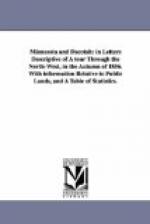Just in the edge of twilight, and when we were a little way this side of Coon Creek, where we had changed horses again, we came in sight of a large fire. It was too much in one spot to be a prairie fire; and as we drove on the sad apprehension that it was a stack of hay was confirmed. The flames rose up in wide sheets, and cast a steady glare upon the landscape. It was a gorgeous yet a dismal sight. It always seems worse to see grain destroyed by fire than ordinary merchandise. Several stacks were burning. We saw that the usual precaution against prairie fires had been taken. These consist in ploughing several furrows around the stack, or by burning the grass around it to prevent the flames from reaching it. It was therefore suspected that some rascal had applied the torch to the hay; though for humanity’s sake we hoped it was not so. The terrible prairie fires, which every autumn waste the western plains, are frequently started through the gross carelessness of people who camp out, and leave their fires burning.
Some of us took supper at St. Anthony. I cannot say much of the hotel de facto. The table was not as good as I found on the way at other places above. There is a hotel now being built there out of stone, which I am confident will exceed anything in the territory, if we except the Fuller House. It is possible we all felt invigorated and improved by the supper, for we rode the rest of the way in a very crowded stage without suffering any exhibition of ill temper to speak of, and got into St. Paul at last, when it was not far from eleven; and after seventy-five miles of staging, the luxurious accommodations of the Fuller House seemed more inviting than ever.
LETTER XVI.
Progress.
Rapid growth of the North-West— Projected railroads— Territorial system of the United States— Inquiry into the cause of Western progress— Influence of just laws and institutions— Lord Bacon’s remark.




